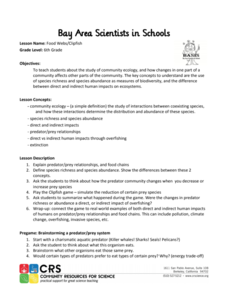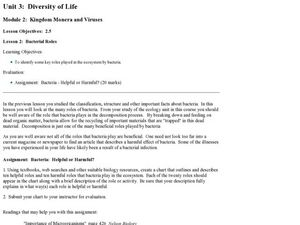Florida International University
The Good, the Bad and the Nasty Tasting
Examine the benefits of chemical defense mechanisms. Organisms in oceans use chemicals to ward off predators. Duplicate this adaptation using a hands-on experiment in which you ward off your predators (your pupils) with some...
Global Oneness Project
Witnessing Icebergs
Camille Seaman's photoessay, "Witnessing Icebergs" documents just a tip of the problem of climate change through images of icebergs in both the Arctic and Antarctic polar regions. After viewing the haunting images, viewers respond...
NOAA
Biological Oceanographic Investigations – Keep Away
As of 2015, there are 53,481 oil wells in the Gulf of Mexico. Scholars determine how species diversity is impacted based on the ecosystem's distance from a drilling platform. It focuses on finding the mean of data sets...
Chicago Botanic Garden
Impacts of Climate on Forest Succession
Part two in a series of four explores the effects of climate on succession or the changing of plant species in a forest. Groups review how to identify trees and then spend a day in the field collecting extensive data on trees to...
Global Oneness Project
Reclaiming Rivers
Robert Hass's article "Rivers and Stories" underscores the importance of rivers in the development of civilization and the importance of reclaiming supposedly dead rivers and implementing policies that protect river health. Groups...
Global Oneness Project
The Consciousness of Nature
Scholars voice their opinions about animal consciousness with an article that challenges common ideas about nature. After reading the article, learners engage in a thoughtful discussion before writing out their arguments...
Channel Islands Film
Santa Cruz Island Restoration Narrative
What would you be willing to do to save an animal from extinction? After re-viewing a video about the restoration of the Island Fox on Santa Cruz Island, individuals adopt the point of view of one of the key players in the...
Society for Science & the Public
Easter Islanders Made Tools, Not War
When studying artifacts, especially tools, how do archaeologists determine what the devices were used for? In what ways might researchers' previous experiences influence their perception of an artifact? An article about researchers'...
Community Resources for Science
Food Webs/Clipfish
Human impact on habitats can be alarming. A hands-on activity has learners explore the impact of human interactions with different environments using a gamified approach. They simulate the impact of a species' abundance under different...
Academy of American Poets
Teach This Poem: "The Shapes of Leaves" by Arthur Sze
Arthur Sze's poem, "The Shapes of Leaves," encourages young scholars to notice and speak for others who "do not speak." The lesson begins with pupils writing about a tree that they really like. The class then examines an image of...
Academy of American Poets
Teach This Poem: “Dead Stars” by Ada Limón
Pay attention! A lesson featuring Ada Limon's poem "Dead Stars" is designed to help learners develop their noticing skills. Class members first study the constellation Orion's image and list what they notice and how the image makes them...
Curated OER
Scavenger Hunt: A Group Collection
Students be complete a collection of living organisms and systems from the school campus.
Curated OER
Effects of Water Pollution on Aquatic Organisms
Students investigate water pollution. They develop an understanding of the behavior of organisms, of the structure and properties of matter, and of natural and human induced hazards by conducting lab tests. They present their data...
Curated OER
Discovering The Oasis
Students participate in a lesson that is concerned with the ecosystem of a local pond. The teacher makes arrangements for students to take a field trip. Time is spent in class for preparation and afterward for debriefing of lab...
Curated OER
Science with Mud!
Eighth graders give some examples of chemical reactions they see everyday. In this chemistry lesson, 8th graders investigate how much water soil can hold. They collect data and compare results with others.
Curated OER
Activity 1: Please Pass the Energy, Food Webs in the Upper Ocean and Hydrothermal Vent Communities
Middle schoolers create food webs for two different ocean communities. They are given cards showing organisms from the surface of the ocean. They arrange them in order of who eats whom. After this class activity, students create a food...
Curated OER
Blue Planet: Seas of Life - Tidal Seas
After viewing the video Blue Planet: Seas of Life, young scholars review oceanic concepts. In this earth science lesson plan, students reflect on the effect tides have on living things and conduct research to create a "tidal trivia"...
Curated OER
Bahamian Terrariums
Sixth graders create a Bahamian terrarium. In this Bahamian ecosystem lesson, 6th graders watch a PowerPoint to see Bahamian biotic and abiotic factors. They bring in 2-3 items for their terrarium.
Curated OER
Protecting Our Native Forests
Students explore environmental awareness by utilizing computer technology. In this ecosystem conservation lesson, students read assigned text which describes the current ecological conditions of Hawaii. Students collaborate in groups to...
Curated OER
Earthworm Movement and Landscape Structure
Students describe differences in animal usage of habitats depending upon successional status of site. They also design other experiments to test movement patterns of animals through habitats of differing structure.
Curated OER
Land Use Issues
Young scholars examine living and non-living things in their environment. They identify trees, plants, and grasses in their neighborhood and those that originate in Illinois in this unit of lessons.
Curated OER
A Walk in the Woods
Students observe an environment, ask questions about what they observe. and design experiments to answer one question they came up with in this upper-level High School or college lesson. The lesson requires an outdoor exploration or...
Curated OER
The Ghost of Populations Past
Students study population distribution and survivorship curves by collecting data regarding age of death of humans from either tombstones, newspapers, or other community resources. Students analyze data by creating graphs and population...
Curated OER
Bacterial Roles
Students study bacteria and the role it plays in the ecosystem. In this bacteria lesson students research the roles bacteria has and submit a chart.
Other popular searches
- Population Ecology
- Animal Ecology
- Human Ecology
- Behavioral Ecology
- Ecology Principles
- Community Ecology
- Pond Ecology
- Ecology Organizations
- Global Ecology
- Ecology Ethics
- Ecology Food Webs
- Ecology and Plants























